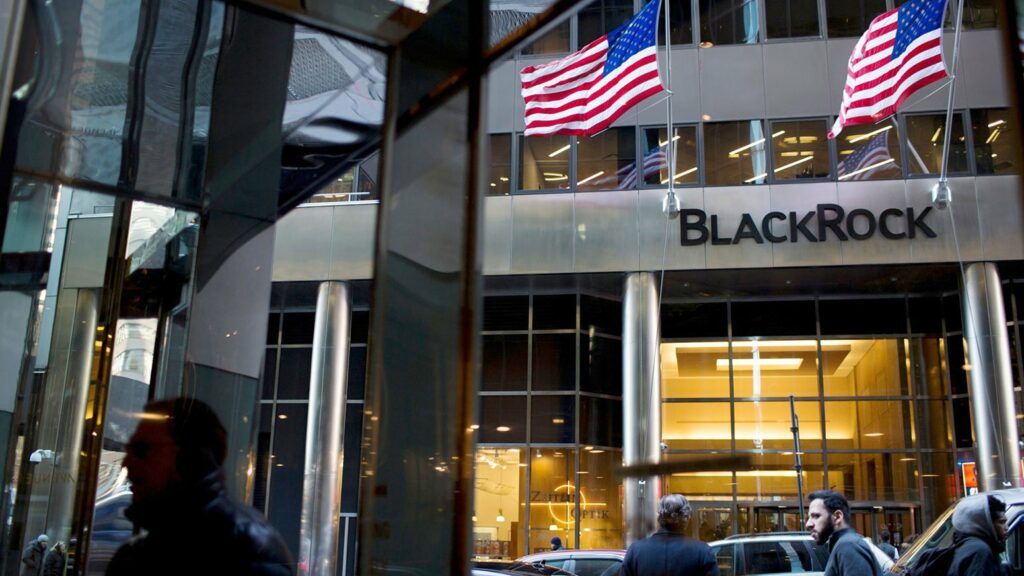Blackrock New Energy Review – that will be the topic of today’s article.
Read about Blackrock New Energy and its comparison with the Utmost International Collective Redemption Bond.
Nothing written here should be considered as financial advice, nor a solicitation to invest.
For any questions, or if you are looking to invest as an expat, you can contact me using this form, or via the WhatsApp function below.
Introduction

BlackRock, Inc. Is an American multinational investment management corporation based in New York. Founded in 1988 initially as a risk management and institutional fixed income asset management company, BlackRock is the world’s largest asset manager with $ 9.5 trillion in assets under management as of October 2021. BlackRock operates worldwide with 70 offices in 30 countries and customers in 100 countries.
BlackRock is committed to positioning itself as an industry leader in Environmental, Social, and Corporate Governance (ESG). The company faced criticism for its inaction due to climate change, close ties with the Federal Reserve during the coronavirus pandemic, anti-competitive behavior, and unprecedented investment in China.
With 401 (k) clients and other investments, BlackRock is the largest shareholder in many competing public companies. For example, see the percentage of shares held by BlackRock: Apple (NasdaqGS: 6.34%) and Microsoft (NasdaqGS: 6.77%), Wells Fargo & Co (NYSE: 4.30%) and JPMorgan, Chase & Co (NYSE: 4.41%). This concentration of ownership has raised concerns about possible anti-competitive behavior.
A 2014 study entitled Anti-Competitive Effects of Common Ownership analyzed the impact of this type of common ownership on airfare. The study found that “prices rise and quantity decreases when airlines competing on a given route are more likely to belong to the same set of investors.” common owners, but perhaps these firms are now “too lazy to compete” with themselves.
BlackRock is a shareholder in many institutional investors who own BlackRock shares. This chain of ownership is similar to the cyclical ownership structures that have been identified, for example, in the United Kingdom.
Investing in China

In August 2021, BlackRock established its first mutual fund in China after raising over $ 1 billion from 111,000 Chinese investors. BlackRock became the first foreign-owned company to be authorized by the Chinese government to conduct a wholly-owned business in the China mutual fund industry. In an article for The Wall Street Journal, George Soros called the BlackRock initiative in China a “tragic mistake” that would “harm the national security interests of the United States and other democracies.”
In October 2021, the non-profit group Consumers’ Research launched an ad campaign criticizing BlackRock’s relationship with the Chinese government.
In December 2021, it was reported that BlackRock was an investor in two companies blacklisted by the US government for human rights violations against Uighurs in Xinjiang. In one case (Hikvision), BlackRock increased its investment after the company was blacklisted.
Is it worth investing in energy funds?

The energy industry has a significant role in the global economy. In fact, the energy sector and the global economy are so closely intertwined that some economists use the cost of crude oil and natural gas as an indicator of global economic health.
However, the energy sector is changing rapidly. Once dominated by traditional oil and gas companies, alternative clean energy sources such as solar, wind, and fuel cells are challenging the traditional energy sector of the past.
The emergence of the clean energy subsector and the transition into it of some of the world’s most dominant energy players create attractive investment opportunities that can generate well above average returns over the long term. That is why, it can not be strange that a very big number of investors are interested in being involved in the energy sector.
The World Energy Fund strives to maximize total income. The fund invests worldwide at least 70% of its total assets in the securities of companies whose main economic activities are related to the exploration, development, production, and distribution of energy.
Blackrock New Energy Fund
Sustainable development characteristics
Resilience characteristics provide investors with specific unconventional metrics. Together with other indicators and information, they allow investors to value funds against specific environmental, social and governance characteristics. The resilience characteristics do not provide an indication of current or future performance, nor do they represent the potential risk and reward profile of the fund.
They are provided for transparency and informational purposes only. The resilience characteristics should not be viewed solely or in isolation, but instead represent one type of information that investors may want to consider when evaluating a fund.
The metrics do not indicate how and whether ESG factors will be integrated into the fund. Unless otherwise stated in the fund’s documentation and included in the investment objective of the fund, the metrics do not change the investment objective of the fund, nor do they limit the investment scope of the fund, and there is no indication that ESG or impact-oriented investment strategy or exclusion filters will be adopted fund. For more information on the investment strategy of the fund, see the fund’s prospectus.
Business participation
Business engagement metrics can help investors gain a better understanding of the specific activities a fund can engage in through its investments.
Business engagement metrics do not indicate the investment objective of the fund and, unless otherwise specified in the fund’s documentation and included in the investment objective of the fund, do not alter the investment objective of the fund or limit the investment scope of the fund, and there is no indication that ESG or Investment impact-oriented strategy or exclusion filters will be adopted by the foundation.
BlackRock’s business risks, as shown above for steam coal and oil sands, are calculated and reported for companies that generate more than 5% of their revenue from steam coal or oil sands as determined by MSCI ESG Research. For companies that generate any income from steam coal or oil sands (at the 0% income threshold), as defined by MSCI ESG Research, it is: steam coal 0.93% and oil sands 52.28%.
Business Participation Metrics are calculated by BlackRock using data from MSCI ESG Research, which provides each company’s business engagement profile. BlackRock uses this data to obtain a consolidated view of the assets and translates it into the market value of the fund in the business areas.
ESG integration
ESG Integration is the practice of incorporating material environmental, social, and governance (ESG) information or ideas alongside traditional measures into investment decision-making to improve the long-term financial performance of portfolios. Unless otherwise stated in the Fund’s documentation or included in the Fund’s investment objective, the inclusion of this statement does not imply that the Fund has an ESG-focused investment objective, but rather describes how ESG information is viewed as part of the overall investment process.
The fund manager considers ESG criteria in combination with other information during the stages of idea generation, company research, portfolio formation, and constant monitoring of the investment process. ESG information may be obtained from third-party providers as well as internal comments and site visits, as well as from the BlackRock Investment Stewardship.
The Fund Manager conducts regular portfolio reviews with the Risk and Quantitative Analysis Team and Chief Investment Officers. These reviews include a discussion of the portfolio’s exposure to significant ESG risks, as well as exposure to sustainability-related business borrowings, climate-related metrics, and other factors.
Pros of investing in mutual funds
Professional portfolio management
The customized portfolio is managed by seasoned industry professionals with expertise in the field. They continually manage your portfolio to help you get the most out of your investment.
Availability
You can buy mutual funds of smaller denominations, ranging from $ 100 to $ 1000. Smaller mutual fund denominations allow investors to make recurring investments as part of their regular monthly buying plans. Instead of waiting for enough money to buy more expensive investments, you can invest in mutual funds right away.
Diversification
Mutual funds can invest in securities of various asset classes such as bonds, commodities, or cash. This helps to diversify the portfolio. If one sector is performing poorly, there is a high likelihood that other sectors will make up for the loss.
Accessible
Investing in mutual funds is very affordable as an individual can invest from as little as $10 every month to a mutual fund. There is no fixed amount that can be invested. Thus, even a small investor can participate in the market by investing in mutual funds.
Liquidity
All it takes to exit a mutual fund is one instruction to your broker/agent to sell it. Funds are returned to your account within 48 hours.
Cons of investing in a mutual fund
Fees and expenses
Mutual funds charge their clients an annual fee, known as the expense ratio, regardless of the fund’s performance. This can be defined as the cost of running a business. In addition, there is an exit load on mutual fund schemes if an investor wishes to buy back investments before a certain period of time.
Blocking clause
There are two types of mutual fund schemes: one that allows you to enter and exit at any time is known as an open scheme, and the other has a blocking period of 3-5 years that is closed. ended the scheme. If an investor wishes to buy back the investment before the blocking period, he needs to pay a certain amount as an output load.
Not guaranteed
There is no guarantee that your mutual fund will be performing well, and it could technically drop to $ 0 if all underlying assets drop to zero.
Volatility
Mutual funds can experience market fluctuations and sometimes generate returns below the general market. The level of risk and return depends on what the fund is investing in.
Capital gains
When you sell an investment for a profit, you must pay capital gains taxes. With most investments, you are in control of when you sell them, so you are in control of when you have to pay taxes. Mutual funds must regularly distribute the capital gains they earn, which gives you less control over when you pay capital gains taxes. This can make it difficult to use tax minimization strategies such as collecting tax losses.
It is always advisable to consult with a financial advisor and understand all points before investing in mutual funds. That is why you are always welcomed with any kind of questions, we will give you the right advices, strategies, and tips on how to make your first investment.
Pained by financial indecision? Want to invest with Adam?
Adam is an internationally recognised author on financial matters, with over 354.9 million answers views on Quora.com and a widely sold book on Amazon



